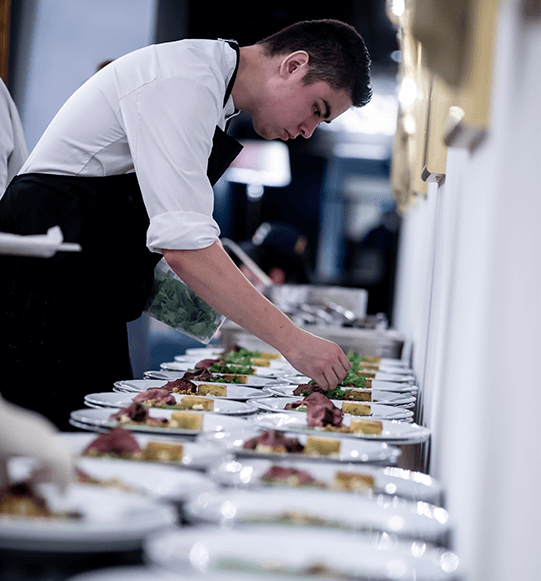Why Florida Companies Expect the servsafe food handler certification florida
Why Florida Companies Expect the servsafe food handler certification florida
Blog Article
Increase Your Task Opportunities: Why a Food Trainer Certificate Is a Must-Have in the Culinary Market
In today's competitive cooking landscape, the importance of a food trainer certificate can not be overstated. As dining establishments and food solution facilities progressively prioritize licensed team, experts equipped with this certification stand to gain a substantial advantage.
Importance of Food Safety
In the cooking market, the importance of food security can not be overemphasized. Contaminated food can lead to severe health and wellness problems, consisting of foodborne ailments, which can affect people and lead to significant responsibility for food facilities.
Food safety and security encompasses a series of treatments, consisting of appropriate food handling, storage space, food preparation, and serving strategies. Following these techniques not only reduces the threat of contamination but additionally aids in abiding by neighborhood health and wellness regulations. Proper training in food safety and security allows cooking specialists to acknowledge prospective dangers and apply safety nets successfully.
Moreover, a solid commitment to food safety can improve the credibility of a cooking facility, promoting consumer loyalty and company development. Consumers are significantly knowledgeable about food security issues, making it vital for food trainers to demonstrate their adherence to ideal practices. Inevitably, prioritizing food safety and security is not simply a regulative demand; it is a fundamental facet of giving high quality food service and protecting the health of customers.

Certification Demands
Food safety and security techniques are just as efficient as the individuals applying them, making qualification a crucial step for food trainers in the culinary sector. To obtain a Food Trainer Certification, prospects should generally complete a training program that covers important subjects such as foodborne ailments, sanitation, individual health, and secure food dealing with strategies.
Many qualification programs are developed to fit various discovering designs, providing choices for online, in-person, or hybrid formats. Participants should pass an exam to demonstrate their understanding of the product, with a minimum passing score often set at 70%.
The period of training can differ, with some programs needing only a couple of hours, while others may expand over a number of days. After successfully completing the training course and exam, prospects obtain their certification, which is usually valid for three to five years, depending on regional policies.
Revival commonly entails taking back the course or finishing a refresher program to make sure that food handlers stay updated on the current practices and requirements. Conformity with these qualification needs not only enhances private understanding but also adds to the overall security and quality of food service procedures.
Work Market Demand
How has the task market for food handlers progressed in current years? The need for food trainers has actually substantially boosted, greatly driven by the expanding recognition of food security and health amongst customers and regulative bodies. With the surge of foodborne health problems, restaurants, catering solutions, and food manufacturing companies are prioritizing the hiring of licensed food handlers to ensure compliance with health and wellness guidelines. This change has actually led to a heightened emphasis on food security training and accreditation as prerequisites for employment in the cooking industry.
In addition, the broadening restaurant industry, specifically with the emergence of food delivery solutions and food trucks, has created a wealth of job opportunities for food trainers. The demand for knowledgeable employees that can securely prepare and deal with food has check my site ended up being critical. servsafe food handler certificate. Additionally, as culinary businesses take on much more rigid security protocols, the value of a food trainer certificate has risen, making it an important asset for task hunters
Consequently, individuals entering the culinary labor force are locating that obtaining a food trainer certificate not just improves their employability yet also positions them positively in a competitive job market that significantly prioritizes food security and health standards.
Benefits of Certification
Getting a food handler certificate provides many advantages that dramatically improve an expert's standing in the cooking industry. Firstly, it demonstrates a dedication to food safety and health, which is vital in avoiding foodborne diseases. This accreditation gears up people with Learn More Here essential expertise pertaining to risk-free food managing practices, including correct storage space, cooking temperature levels, and sanitation procedures
In addition, having a food trainer certification can increase a person's employability. Several employers prioritize candidates with this certification, seeing it as an indication of professionalism and trust and expertise. This can lead to better job chances and potentially greater salaries, as certified individuals are usually delegated with higher responsibilities.
Moreover, the certification promotes a society of safety and security and accountability within the office. It not just improves a worker's confidence in their abilities yet likewise promotes a safer environment for consumers and colleagues alike. Keeping a food trainer certification can open up doors to further academic and career improvement possibilities within the culinary area. On the whole, this qualification is a critical investment that profits both experts and the facilities they offer, inevitably adding to a successful culinary sector.
Steps to Get Certified
Getting a food handler certification includes a simple process that can establish individuals on a course to enhanced career potential customers in the culinary sector. The initial step is to find an approved program visit this site or training service provider that provides food security training courses. Lots of companies provide both in-person and online alternatives, permitting flexibility in learning.

After effectively passing the exam, people will certainly get their food handler certification, which is usually legitimate for a certain period, usually 3 to five years. To maintain certification, it might be essential to finish correspondence course or take back the examination before the expiration date.
Lastly, it is essential to verify any type of regional or state-specific guidelines concerning food handler certification, as requirements can vary. By adhering to these steps, people can acquire their certification and dramatically enhance their employability in the competitive cooking landscape.

Verdict
In verdict, getting a food trainer certification is critical in the cooking sector, as it ensures adherence to food safety criteria and boosts employability. With the expanding need for qualified workers, this credential not only opens doors to task opportunities but additionally adds to career innovation and increased gaining possibility. Inevitably, a food trainer certificate represents a commitment to safety and professionalism, fostering a society of liability that profits both workers and employers in the food solution market.
Report this page